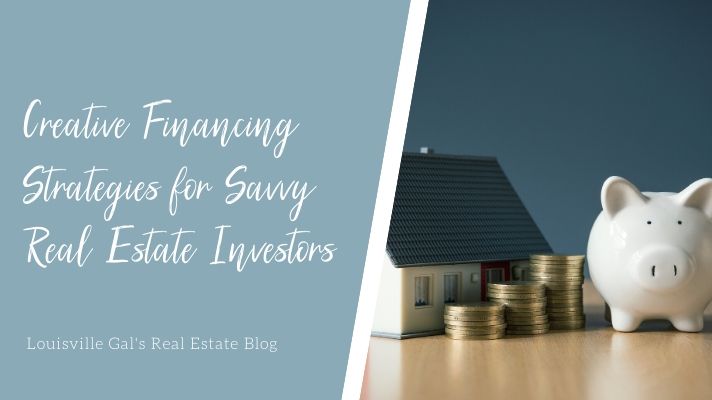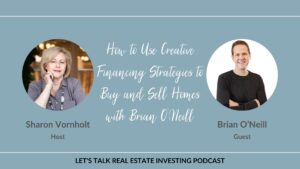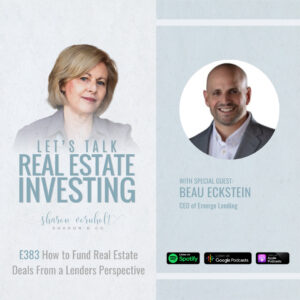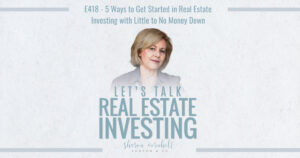
Let me ask you this; are you using any creative financing strategies in your business today? If your answer is no, what is holding you back? It’s probably because you don’t understand the different ways you can do this. Your ability to use creative financing strategies will change your business because you will no longer have to depend solely on traditional funding sources for your deals.
The two biggest problems real estate investors everywhere have, are finding deals and funding their deals. Finding deals is all about marketing. If you do consistent, targeted marketing you will have leads coming in the door. However, once you’ve found a property, where do you get the money to fund the deal? That’s what I want to talk about today. The importance of adding creative financing strategies to your real estate investing business.
Learning how to structure your deals creatively will give you so much more opportunity. In fact, closing on a property will never be a problem once you understand these strategies and know-how to implement them in your business. Your ability to quickly find a way to fund a deal, will likely “make or break” your business over time.
Don’t Be a “One Trick Pony”
If you are relying solely on banks for funding your deals, that’s exactly what you are. You only have one way to close deals.
Now don’t get me wrong; investor friendly banks should always be one of your go-to funding sources. However, I can promise you that one day that door will be closed when you need it. You will find yourself in a position where you won’t be able to get a loan from a traditional lender. Their decision might be based on the economy, the mix of property that you have in your rental portfolio, or one of many other things. Having a good understanding of creative financing strategies will completely eliminate that problem when that day comes (and it will come).
Learning from the Past
One thing I learned in the 2008 real estate crash was that it was essential for the survival of your real estate investing business to have more than one way to close your deals. Investors that were only using banks and commercial lenders at that time were in trouble. To survive, they had to get creative; they had to learn creative financing strategies.
From a purely practical standpoint, could you do more real estate deals if banks weren’t your only source for financing? The answer is definitely yes! What if you could double or triple the number of deals you are doing now without relying on banks or using any of your own cash? What would that look like for you? How would that change your business?
I’m going to go over 8 creative financing strategies today that you can use in addition to traditional investor friendly banks. But before I do that, let’s talk about the situation we find ourselves in today, and what the future of real estate may look like on the other side of Covid-19.
The Future of Real Estate
Today is a unique time in history where no one really knows for sure what the real estate market will look like 12-18 months from now. Most people have never experienced anything like Covid-19 and this pandemic in their lifetime. However, we can make some predictions based on what has happened historically after other major events like the real estate crash in 2008. This timeline was a little different in some areas. For some people, it was 2007, while others didn’t fully feel the effects of the market crash until 2009.
In the next few months, you may not see a lot of change. Houses today, are still selling for top dollar and they are getting multiple offers in many instances. That is on the retail side of real estate.
However, there is another side to this. Lenders and landlords are working with people that can’t pay their rent or their mortgage, in part because you cannot foreclose or evict someone for non-payment at this time. The government has enacted laws that prevent landlords and mortgage companies from doing these things. This will likely go on for a few months at least, and it has put landlords in a tough situation. I’ll talk more about that in a minute.
Stimulus Packages
There are several government stimulus packages that have been put in place as well as new unemployment insurance programs designed to cover more people that are unemployed due to Covid-19. But the sad reality is that a lot of people either don’t qualify for these programs or they haven’t received these benefits. People are struggling just to survive.
Here is another reality. As the states begin to open up and try to get people back to work, there will come a time when these programs designed to help people and to get the economy back on track will go away. I believe this is when you will begin to see a huge shift in the real estate market. People that were already struggling will likely reach a breaking point.
Finding the Opportunity in any Real Estate Market Requires You to Solve Problems
Our job as real estate investors has always been to be a problem solver. It has been a strong seller’s market for quite a while now when it comes to retail sales. This has made it challenging for real estate investors to find good deals. In the upcoming months, things are going to begin to change. There are some ways you can position yourself to help sellers during this challenging time.
First of all, ask yourself, “How can I help these people”? If you can do that and you end up making money in the process, that’s a win-win for everyone. Here is what I believe you’re going to see:
- Many people that own investment property will be hurting financially and they will get out of the business. This will be true for folks that have a W-2 job that invests part-time, as well as full-time investors that own a rental property that now have unpaid rent and /or vacant units. They need that income to keep their businesses afloat. You can expect that some investors will just get out of the business; they will throw in the towel. Some landlords will be looking for someone to buy these properties. Since they are investors themselves, they may be open to some type of creative financing strategies.
- People that were financially stable before Covid-19 who never imagined themselves without a job and stable income will need to make difficult choices regarding real estate and the lifestyle they have become accustomed to. People in this group will be looking for solutions that simply provide relief; that allows them to move on. Once again, in times like this, they may be more motivated to accept a solution other than all cash at least in the short term.
- The courts have been closed for several months so there will be a significant backlog of probates that couldn’t be filed. Remembering the probate process, these properties must be sold before the estate can be closed. The personal representatives of these estates have seen this process drag out much longer than normal, and they will be anxious to settle the estates and move on with their lives. There will no doubt be a huge opportunity when it comes to probates. These will need to be cash sales.
- Foreclosures and evictions have been delayed. Where you live will determine how this will play out in your area. For instance, in some states, the foreclosure process is relatively short. It could be as little as 8 or 9 months start to finish. In other areas, foreclosures can take several years or more. In these states where foreclosures take longer, the opportunity to help sellers will span out over a longer period of time. There will be people willing to sacrifice their equity in their property to try to salvage their credit when possible. If they can work things out with other creditors like credit card companies, they will be many people ready to sell their homes to prevent foreclosure on their credit report.
- There will no doubt be a lot of REO’s or bank-owned properties as well. Again, depending on where you live and the level of foreclosures in your area, this will vary from city to city.
- There will be more bankruptcies and divorces. Our current economic environment will push many people into one or both of these situations. Once again since the courts are closed. there will be a surge in divorces and bankruptcies.
Remember….
Your reputation is everything in this business. Don’t throw that away by taking advantage of people who are in dire straits. Be the person that looks for an ethical solution for each one of these motivated sellers you come across.
OK. Let’s talk about creative financing strategies.
8 Creative Financing Strategies
Here are 8 ways to close a deal in addition to using traditional investor friendly banks:
- Wrap Mortgages
- Buying “Subject-to” the existing mortgage
- Seller Financing
- Lease and Options (where you control the property)
- Transactional funding
- Hard Money Loans
- Self Directed IRA’s
- Private money
1.Wrap Around Mortgages
Here is the definition of a wrap mortgage: ”A wraparound mortgage, more commonly known as a “wrap”, is a form of secondary financing for the purchase of the real property. Under a wrap, a seller accepts a secured promissory note from the buyer for the amount due on the underlying mortgage plus an amount up to the remaining purchase money balance”. As an example, if the seller is asking $100,000 for the property and there is an underlying mortgage of $80,000, a new second mortgage would be created for $20,000. The buyer would be responsible for both mortgages.
One disadvantage of a wrap mortgage would be if the buyer fails to make the payments on the wrap-around mortgages. The seller could lose the money on the second mortgage (for the $20,0000). And, if the seller is unable to pay the original mortgage, this could result in foreclosure of the seller’s home.
2. Subject-to
When a property is sold “subject-to” the original mortgage, this loan stays in the seller’s name but the buyer gets the deed and is in full control of the property. If the new buyer fails to make the mortgage payments, the seller is still responsible for the original mortgage and it is their credit that is damaged in a default. You may the risk of the lender calling the loan if they find out about this situation.
I bought a property subject to the existing loan when the couple was getting divorced. They had a 100% VA loan on the property, so there was little equity in the property. There only real option was to let it go back to the bank or sell it subject to the existing mortgage.
3. Seller Financing
I love seller financing. This simply means that you agree to buy the property, and the seller provides the financing. This arrangement can be good for both the buyer and the seller. The buyer doesn’t have to get traditional financing, and the seller gets monthly income and can avoid paying capital gains on the sale of investment property until a later date. The buyer may or may not have to put money down or money into the deal.
4.Lease Options
For someone that is not able to buy property today, a lease option gives them a very viable route to owning property. There are two parts to this. The lease and the option. A lease is just that. A lease or rental agreement. The option gives the person leasing the property the option to buy it at a future date for a set amount of money. Lease options are also one-way investors can control a property with little money out of their pocket.
When is a lease option a good strategy? Here is an example. If someone has experienced some type of hardship that prevents them from buying a house today, it is a way to find a property, live in it for a time, then buy the property down the road typically in 18-24 months. They would “exercise their option” to buy the property and get a new mortgage. A lease option is attractive to a buyer if for instance they got a divorce and their credit “was dinged”. They might have a good job today so they’re able to pay the monthly rent, but they need a year or two to clean up their credit.
5. Transactional Funding
Transactional funding is short term financing, and it is hard money lending. This timeframe for this type of loan is usually 2 to 5 days. It’s often used when a wholesaler has an end buyer lined up, but they don’t have the ability to close on the property with their own funds.
There can be various reasons why a wholesaler might have to close before selling the property, but here are a few. Transactional funding can be used for transactions like short sales, or in other situations like REO’s where banks don’t allow assignable contracts. In these cases, you must close on the property before selling it to your end buyer. Typically, these two transactions are performed as simultaneous or double closings.
6. Hard Money
Hard money loans are funded by private investors (rather than traditional lenders), and they are short term loans. The term of these loans is typically around 12 months, but it can be extended in some cases depending on the lender. Hard money loans are secured by real estate. One thing to note is that hard money lenders are more concerned with the profitability of the deal rather than the credit of the borrower. They will certainly want to know that you are able to refinance the property at the end of the term of the loan so they can get their money back, but their main concern is the property itself.
7. Self-Directed IRA’s
Having a Self-Directed Roth IRA is one of the best ways possible to build wealth if you are a real estate investor. You can buy property using the funds in your IRA, and the money you make on those investments can grow tax-free so long as you follow the rules. There are certain types of properties you can’t purchase with your IRA such as vacation homes or your primary residence. There are also a lot of other rules, so consult with a professional so that you don’t make mistakes that could cost you money or cause your IRA to be disqualified. This is no time to “DIY”.
8.Private Money
Today I want to focus on what I think is one of the absolute best funding options for investors and that is private money. I also want to give you a couple of tips for how to talk to private money partners about the “opportunity”.
Raising Private Money
Raising private money is a big topic, but I want to touch on that just a little bit today. Having a source of private money for your deals gives you a huge advantage over other investors. It allows you to confidently make cash offers and as we all know, cash is king. What holds investors back more than anything when it comes to raising private money is their mindset.
There is an art to inviting people to invest with you that makes it so appealing they just can’t wait to give you their money.
To do this, it’s critical that you start to think about this process a little differently. Look at these folks as private money “partners”. When you have a conversation with a private money partner, you’re not asking for money. You are giving them an opportunity to make much higher returns on their money than they’re currently getting (in almost every case), that is safely secured by real estate. Can you see how different this conversation will be once you adopt this new mindset? It changes everything.
Where Can I Find Private Money Partners?
Private money partners are everywhere, but these are the 3 most common sources.
1. Your sphere of influence.
Most people start out asking someone they know. This might be folks like your:
• Friends
• Family members like your parents
• Accountant
• Attorney
• Doctor
• Dentist
These are people that move through your daily life. I would also say this; don’t pre-judge people by their looks, the car they drive or the home they live in. You never know who has cash sitting in the bank. Wealthy people often live frugal lives. These folks may have no idea this type of opportunity exists unless you tell them. Here’s that word again; opportunity.
2. The next source of private money is other real estate investors. They are also a good source of seller financing.
You will find investors willing to loan money in every REIA across the country. This is just one of the many reasons to belong to your local REIA. Some of these investors loan money in addition to building their own rental portfolios.
It’s also common for investors to sell one of their own properties to finance the deal for you. Why would they be willing to sell you a property at a discount and loan you the money? The reason is that it’s good for them. They get rid of unwanted property, they will get a down payment in most cases, and in this process, they create an ongoing stream of passive income. It’s a win-win situation for everyone.
3. The last source of private money is individuals that have the cash they want to grow but would rather be lenders than landlords. They just don’t want the hassle of owning property. Or possibly, they own property, they have additional cash to invest, but they don’t really want to add more properties to their portfolio. Becoming a private lender is not only more attractive to them, but it’s also very lucrative.
Let’s recap. Here are 8 ways to close a deal in addition to using traditional investor friendly banks:
1. Wrap Mortgages
2. Buying “Subject-to” the existing mortgage
3. Seller Financing
4. Lease and Options (where you control the property)
5. Transactional funding
6. Hard Money Loans
7. Self-Directed IRA’s
8. Private money
Final Thoughts
I hope you have found this information helpful.
Remember that great deals aren't found, they are created!
Thanks for Listening to the Show!
I would really love to hear from you. Please leave a note in the comments section below. And, if you enjoyed this episode, please share it on social media using the social share buttons below.
Subscribe and Review in iTunes
Are you subscribed to my podcast? If you’re not, I want to encourage you to do that today so you don’t miss a single episode. I’m doing some special bonus episodes and if you’re not subscribed there’s a good chance you’ll miss out on those. Click here to subscribe in iTunes!
I would be really grateful if you left me a rating and review over on iTunes, too. I love reading those reviews, and they help other people find my podcast. Here's how you do that: Just click here to leave a review. Once you're on Apple podcasts, click “listen in iTunes”. Then select “Ratings and Reviews” and “Write a Review”. Let me know what your favorite part of the podcast is. Thank you!
You can listen and subscribe on Stitcher by clicking this link: Subscribe on Stitcher
If you want to schedule a 1 on 1 call with me to talk about specific strategies for building your brand and creating more effective marketing for your business, you can do that here by clicking this link.
Have you gotten your freebies and subscribed to the blog? If not be sure to do that today so you don’t miss any of the business building tips I have coming your way. I want this year to be your best year ever!








